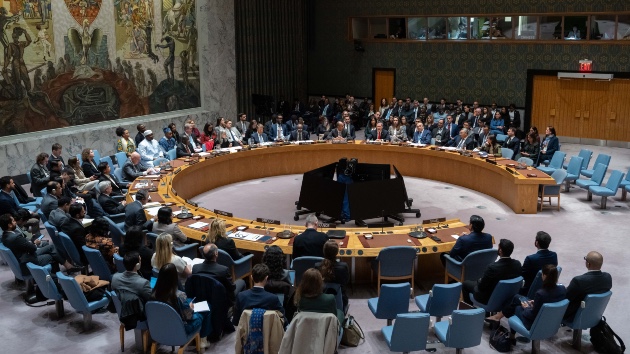
(LONDON) -- The United Nations Security Council voted to authorize President Donald Trump's post-war plan for Gaza, with the president quick to declare it "one of the biggest approvals in the History of the United Nations."
Trump's 20-point plan, which was the basis for the ceasefire agreement signed by Israel and Hamas last month, was the subject of the resolution put to the council by the U.S. on Monday.
It was approved by a 13-0 vote, with Russia and China -- both of whom wield veto power at the council -- abstaining.
The vote gives authorization to the Board of Peace envisioned in Trump's Gaza plan, which is intended as a transitional authority to oversee the strip's redevelopment. The board is expected to be chaired by Trump. The only other member proposed by Trump to date is former British Prime Minister Tony Blair.
The vote also gave approval for the International Stabilization Force, which -- under the command of the Board of Peace -- will provide security, train a new Palestinian police force and ensure the demilitarization of Gaza.
Trump touted the "incredible Vote" as a "moment of true Historic proportion!," in a post to social media.
But key questions remain regarding both pillars of the Gaza peace effort -- the Board of Peace and the International Stabilization Force.
In his social media post, the president said that "members of the Board, and many more exciting announcements, will be made in the coming weeks." All parties involved in the peace process will be watching closely to see the makeup and political bent of the eventual Board.
Likewise, the composition and capabilities of the International Stabilization Force remains unclear. Ahead of Monday's vote, U.S. Ambassador to the U.N. Mike Waltz said in a statement that the force would be drawn from "a strong coalition of peacekeepers, many from Muslim-majority nations like Indonesia, Azerbaijan and others."
"These brave souls will secure Gaza's streets, they will oversee demilitarization, they will protect civilians and they will escort aid through safe corridors, all while Israel phases out its presence and a vetted Palestinian police force takes on a new role," Waltz said.
But practical progress has been slower. Earlier this month, for example, a United Arab Emirates presidential adviser said the nation "does not yet see a clear framework for the stability force and under such circumstances will not participate."
The U.N. said contributing nations will send troops "in close consultation and cooperation" with Egypt and Israel.
But that close cooperation is already blocking some from involvement. Israeli Prime Minister Benjamin Netanyahu, for example, said he would not allow Turkish forces to participate.
While negotiations continue as to the makeup of the Board of Peace and International Stabilization Force, the Gaza ceasefire looks far from secure. Hamas agreed to return all living and dead hostages as part of the deal, but three hostage bodies are still thought to be inside Gaza.
Israeli forces have withdrawn to the so-called "yellow line" inside Gaza as stipulated in the deal, but there has already been one short resurgence in fighting since the ceasefire went into effect.
There have also been several instances in which Israeli forces have killed people alleged to have crossed the line. The Hamas-run Gaza Ministry of Health said on Sunday that since the ceasefire was signed on Oct. 11, 266 Palestinians have been killed by Israeli actions.
Hamas, meanwhile, said after Monday's U.N. vote that it will not disarm and that the issue of its weapons cannot be separated from "a political path that ensures the end of the occupation, the establishment of the state and self-determination."
Netanyahu has said that Israel will disarm Hamas by force if it does not do so voluntarily, or in coordination with the proposed International Stabilization Force.
"We believe that this plan will lead to peace and prosperity, as it includes full demobilization, disarmament and a process to deradicalize Gaza," Netanyahu said in a statement following Monday's vote.
"We will also begin the process of demilitarizing and disarming the Gaza Strip and ending Hamas rule," Netanyahu said.
"Israel extends its hand of peace and prosperity to all its neighbors, and calls on them to normalize relations and join the movement to remove Hamas and its supporters from the region," the prime minister added.
For all Palestinian factions and influential foreign parties, the issue of Palestinian statehood remains a key and unanswered element of any long-term peace deal.
A slew of nations formally recognized a Palestinian state in September as they pushed Israel and the U.S. to secure a ceasefire in Gaza.
The eventual agreement stated that, if redevelopment in Gaza and significant reform to the Palestinian Authority proceeds, "the conditions may finally be in place for a credible pathway to Palestinian self-determination and statehood, which we recognize as the aspiration of the Palestinian people."
That clause prompted significant consternation in Israel, where Netanyahu, his officials and particularly his far-right coalition partners vowed to block any semblance of Palestinian statehood.
Reacting to Monday's vote, Netanyahu made no comment on that aspect of the blueprint. But just one day before, the prime minister told a cabinet meeting that his opposition to Palestinian statehood "has not changed one bit."
"I have been rebuffing these attempts for decades and I am doing it both against pressures from outside and against pressures from within," the prime minister said. "So, I do not need affirmations, tweets or lectures from anyone."
ABC News' Michelle Stoddart and Jordana Miller contributed to this report.
Copyright © 2025, ABC Audio. All rights reserved.

